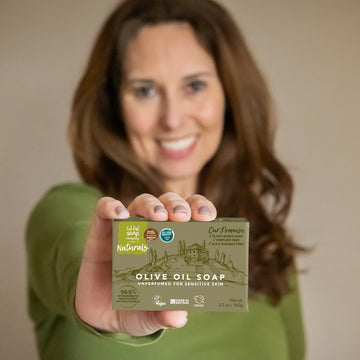Time for another deep dive, and this time we’re focusing on our Unperfumed Pure Olive Oil Soap Bar for sensitive skin. Read on to find out more about the ingredients we use, and exactly how they benefit your skin.
Who is the Unperfumed Pure Olive Oil Soap Bar for?
It's a bestseller for a reason! Our Unperfumed Pure Olive Oil soap bar is great for all skin types, but especially if you have very sensitive skin. This one is a tweak on the traditional ‘Castille’ recipe - a highly versatile multi-purpose soap, made from natural fats.
Like Castille soap, this bar has a slightly tacky feel thanks to the olive oil, and - again, like Castille soap - it can be a multi-purpose soap too: use it as a gorgeous melting makeup remover, and even to clean your makeup brushes - we get a lot of make-up artists telling us they can’t live without it!
What’s in the Unperfumed Pure Olive Oil Soap Bar?
So let’s get down to it. What’s in our bar, and why is it so beneficial for your skin, and for the planet?
Like all our other bar soaps, our Unperfumed Pure Olive Oil soap bar contains absolutely no nasties. It's free from detergents, SLS, sulphates, alcohol, parabens, sorbates, silicones, palm oil and synthetic preservatives. It is made from 99.9% naturally deceived ingredients, plant based and 100% vegan and Leaping Bunny cruelty free. And like all our other soap bars, it’s plastic free, eco-friendly and biodegradable - both soap and packaging.
Olive Oil

The hero of the bar - olive oil. You’ll see this ingredient listed as Sodium Olivate - the generic name for the mixture of olive oil and sodium hydroxide (also known as lye. Lye is what makes our soap real soap).
Olive oil is known for its deeply moisturising properties. It's rich in Vitamins A and E and helps to nourish and rejuvenate the skin. It also has natural antioxidants which help to protect the skin against free radicals and prevent premature ageing. We love this ingredient because it's so kind to skin, and really makes the bar feel luxurious, with lasting hydration.
Coconut Oil
Another hero ingredient - coconut oil (appearing on our list as Sodium Cocoate, the generic name for the mixture of coconut oil with sodium hydroxide) is there to give you a rich and creamy lather. It's also there to protect the skin, allowing you to cleanse without stripping away natural oils.

Coconut oil also has natural antibacterial properties which help the skin to maintain a health barrier against infections and irritations. And, of course, we all know that coconut oil is a wonderful moisturiser, helping skin to feel hydrated, soft and smooth. The perfect partner for olive oil in this bar!
Glycerin
Glycerin is naturally derived from both olive oil and coconut oil, and it’s a great humectant - helping to draw moisture into the skin. This ingredient will help to keep the skin supple and smooth, whilst at the same time protecting the skin and preventing dryness too.
When it comes to our Unperfumed Pure Olive Oil soap bar, you’ll see that alongside the olive oil, coconut oil and glycerin, we also list Sodium Chloride (this is salt - a natural mineral) and Tetrasodium Glutamate Diacetate. This is a naturally derived preservative that aids stability in the product.
Deciphering ingredient labels on soap bar packaging
It's not always easy to decode the ingredient lists on cosmetic products! Here at Little Soap we try to be as transparent as possible - do always get in touch with any questions or queries, as we’re always happy to help.
Our ingredients are listed clearly on our website and on our products, but we know even our lists can look confusing. Take a look at our guide to ingredients here, and follow these general rules of thumb when choosing other products:
- Ingredients are listed by weight, so whatever comes first makes up the highest percentage of the product.
- Any ingredient making up less than 1% of a product formula can be listed in any order.
- Ingredients in soap can be derived from different sources. Avoid ingredients derived from synthetic chemicals, opting instead for those derived from plant or mineral sources - such as olive oil, coconut oil, salt, clay etc.
- Know which ingredients are best avoided - these include Parabens, Sodium Lauryl Sulphate - also known as SLS - Triclosan - also known as TCS - animal ingredients - such as honey, goat's milk, tallow (animal fat), and lanolin.
